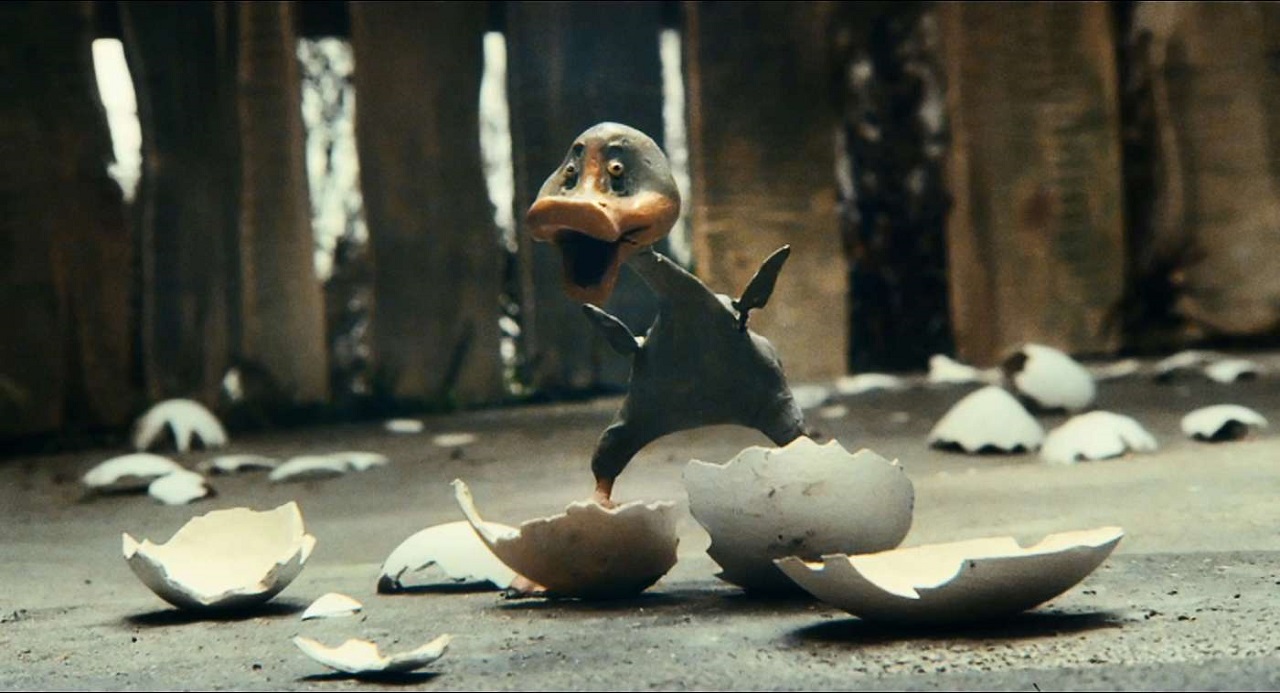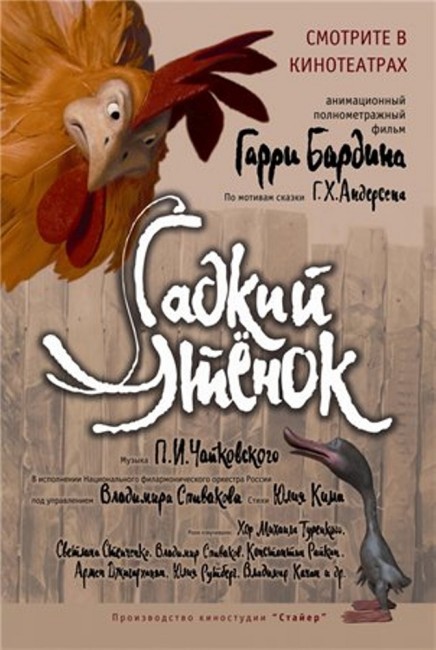(Gadkiy Utyonok)
Crew
Director/Screenplay/Producer – Garri Bardin, Based on the Fairytale by Hans Christian Andersen, Photography – Ivan Remizov, Music – Pyotr Tchaikovsky, Animation – V. Homutov, V. Manevich, T. Molodova, M. Parfenova, I. Sobinov-Kassil & O. Veselova, Art Direction – Kirill Chelushskin. Production Company – Stayer Animation.
Plot
A rooster finds a strange egg in the coop. After the egg hatches, it produces a strange, ugly chick that is different to any of the other birds. The poor duckling is rejected by the other chickens, geese and ducks as it tries to fit in and find a parent. Tossed into the outside world, it tries to make its way there before finding its true maturity as a swan.
This is an adaptation of the Hans Christian Andersen fairytale The Ugly Duckling (1844). The fairytale is a classic story of the ugly and socially rejected blossoming into something of great beauty – indeed, the term ugly duckling has become one in popular usage for someone socially awkward who makes an unexpected transformation. The Ugly Duckling has seen a number of adaptations in various media, the most popular probably being the ballet by Sergei Prokofiev in 1914. Disney produced a short animated version The Ugly Duckling (1939), while Martin Gates made a feature-length animated version The Ugly Duckling (1997).
This version comes from Russian director Garri Bardin. Bardin has been making short Claymation-animated films since the 1970s and has previously made other fairytales adaptations such as Grey Wolf and Little Red Riding Hood (1990) and Puss in Boots (1995). All of Bardin’s eighteen other films are shorts and The Ugly Duckling is his first feature-length film.
Garri Bardin was 69 years old when The Ugly Duckling came out. This may hold some record for the age at which a director makes their feature-film debut. Nevertheless, the one thing it does mean is that Bardin has been making films since the heyday of the Soviet regime in Russia. Clearly, the fall of the Soviet empire is one that Bardin has greatly welcomed. His two other fairytale shorts have operated as mordant political satires about the Communist regime – the Grey Wolf in Grey Wolf was an allegory for the oppressiveness of a regime that swallows everything up, while Puss in Boots became a comedic parable about the meeting between East and the West.

With The Ugly Duckling, Garri Bardin makes another satiric dig at Communism. The scenario here – Claymation set amid the fowls in a barnyard – is not unakin to Aardman Animation’s Chicken Run (2000). (Indeed, Garri Bardin’s work is frequently compared to Aardman). Where Chicken Run was essentially a World War II POW escape movie set among the chickens, The Ugly Duckling reverses it and depicts the interior of the coop as a military operation.
More to the point, Bardin depicts the coop as one modelled along the lines of the classic Communist regime in its heyday. Everybody sings rousing anthems in unison about how great their coop over any other. There are plentiful parades and dances arranged to show off their glory, even scenes where they come out showing off their production of eggs. Up against this, Bardin clearly favours the downtrodden and pitifully rejected ugly duckling as a voice of non-conformity – the fairytale is broad enough that the ugly duckling can be read as everything from the spirit of individuality to the voice of artistic freedom.
Garri Bardin’s Claymation is easily the equal of Aardman. The characters are brought to life with an enormous amount of colourful detail and charm – Bardin conveys the inert clay with considerable life and character. The Ugly Duckling manages to be a pitiful character that one cannot help but feel sympathy for – all of the duckling’s songs come in a plaintive child’s voice that manages to be completely heart rendering. And the results are perfectly charming. Moreover, it is also a film that, its’ Communist allegories aside, remains perfectly faithful to the Hans Christian Andersen fairytale – unlike say the 1997 animated version, which padded the basics out with an adventure story and a host of other characters.


